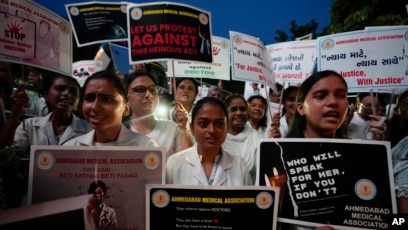
Medical facilities across India halted services on Saturday, with only emergency care remaining operational, following a 24-hour strike by healthcare professionals. The protest was ignited by the shocking rape and murder of a doctor in Kolkata, which has stirred deep outrage within the medical community.
The tragic incident, involving Dr. Priyanka Singh, a respected physician at a Kolkata hospital, has galvanized medical workers nationwide. Dr. Singh was found brutally assaulted and killed in her apartment last week, an event that has drawn widespread condemnation and led to the unprecedented strike.
Hospitals and clinics, from major urban centers to rural areas, reported a significant reduction in services. Routine treatments and consultations were suspended, severely impacting patients who rely on these services for ongoing care. Emergency departments remained open, providing critical services and managing urgent cases.
The strike has highlighted ongoing issues of safety and violence against healthcare professionals in India. Medical practitioners argue that the incident is part of a disturbing trend of attacks on doctors and hospital staff, which they claim often goes unaddressed. Protests have not only erupted in Kolkata but have also spread to other major cities, reflecting widespread frustration and a demand for stronger protective measures.
Authorities in Kolkata have launched an intensive investigation into Dr. Singh’s murder. Several suspects have been apprehended, and police are working to uncover further details about the crime. However, the community’s call for justice extends beyond just resolving this case, focusing on systemic reforms to prevent future violence against medical personnel.
The Indian Medical Association (IMA) has been vocal about the need for enhanced security protocols in hospitals and stricter legal actions against perpetrators of violence. They argue that without significant changes, the safety of medical professionals remains precarious, affecting their ability to provide care without fear.
In response to the strike, government officials have pledged to review existing safety measures and work on legislative changes to better protect healthcare workers. However, the effectiveness of these measures and their timely implementation remain subjects of scrutiny and debate.
The impact of the strike has been palpable, with many patients expressing frustration over the disruption in services. Health authorities are grappling with the logistical challenges of managing a sudden surge in emergency cases while attempting to address the broader implications of the strike.
The ongoing situation underscores a critical need for dialogue between medical professionals, government officials, and law enforcement agencies. The strike has not only drawn attention to the specific case of Dr. Singh but also to broader issues of safety within the healthcare system. As the investigation progresses and discussions continue, the hope is for a resolution that ensures both justice for Dr. Singh and the safety of those who work tirelessly to provide care to others.



